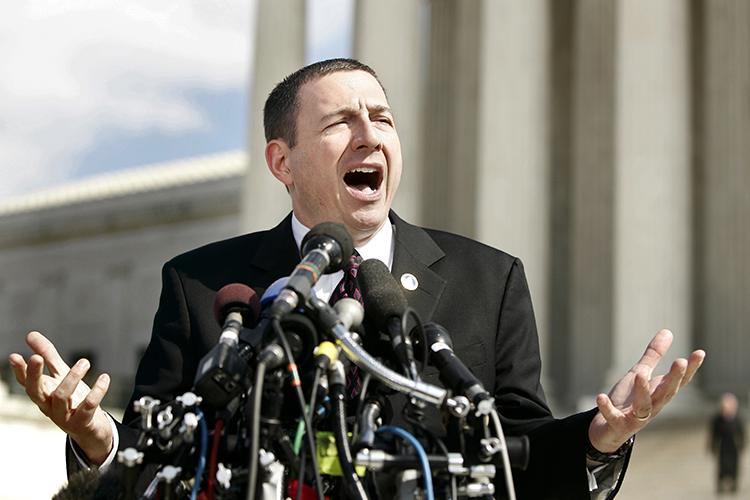Calls mount for binding SCOTUS ethics code after anti-abortion crusader alleges Hobby Lobby leak

The Rev. Rob Schenck speaks outside the U.S. Supreme Court building in 2005 after arguments were heard over two cases involving Ten Commandments displays in public courthouses. Photo by Gerald Herbert/The Associated Press.
A former anti-abortion crusader’s allegations about a leak of the U.S. Supreme Court’s decision in a case involving retail company Hobby Lobby have led to calls for hearings and a binding ethics code for the justices.
The New York Times reported Saturday on the allegations by the Rev. Rob Schenck, who said he learned in advance that Justice Samuel Alito would write the opinion in Burwell v. Hobby Lobby Stores, and it would favor religious rights of employers. The June 30, 2014, decision exempted closely held corporations with religious objections from having to provide mandatory contraceptive coverage for employees.
Schenck said he learned about the upcoming decision from Gayle Wright, a donor to his evangelical nonprofit, after she and her husband had dinner with Alito and his wife, Martha-Ann. The Wrights had been introduced to Alito through their work for the Supreme Court Historical Society.
Schenck sent a letter with his allegations to Chief Justice John Roberts after the May 2022 leak of Alito’s draft opinion overturning the right to abortion in Dobbs v. Jackson Women’s Health Organization. Schenck thought that his information could be relevant to the leak probe.
Schenck has previously detailed his group’s efforts to influence the justices in stories by Politico and Rolling Stone.
Schenck told those publications that he hosted prayer sessions in chambers and on Supreme Court grounds with Alito and Justices Clarence Thomas and Antonin Scalia before his death in 2016. He also recruited wealthy volunteers to entertain the justices while pushing their conservative positions—without commenting on specific cases.
The New York Times pointed out that Schenck’s views on abortion have changed, and he “is trying to reestablish himself, now as a progressive evangelical leader.”
Wright said Schenck’s claim about the Hobby Lobby leak was “patently not true,” while Alito said the claim that he or his wife told the Wrights about the decision was “completely false.”
CNN, Politico, the Washington Post and the National Law Journal had coverage.
“The allegation that the Wrights were told the outcome of the decision in the Hobby Lobby case or the authorship of the opinion of the court by me or my wife is completely false,” Alito said.
“My wife and I became acquainted with the Wrights some years ago because of their strong support for the Supreme Court Historical Society, and since then, we have had a casual and purely social relationship. I never detected any effort on the part of the Wrights to obtain confidential information or to influence anything that I did in either an official or private capacity, and I would have strongly objected if they had done so. I have no knowledge of any project that they allegedly undertook for ‘Faith and Action,’ ‘Faith and Liberty’ or any similar group, and I would be shocked and offended if those allegations are true.” Alito said.
The New York Times and other publications covered the reaction to Schenck’s allegations. Reactions included:
• Fix the Court, a court transparency group, called for passage of the Supreme Court Ethics, Recusal and Transparency Act, which would require justices to write and adopt an ethics code; strengthen recusal rules; and adopt disclosure rules for gifts, income and reimbursements. Similarly, Democratic U.S. Sen. Amy Klobuchar of Minnesota said in a tweet the justices should “operate under the same ethics rules as every other federal judge.” (Fix the Court, the New York Times)
•Brian Fallon, executive director of Demand Justice, a legal advocacy organization, said the Senate Judiciary Committee should investigate the new leak report. (The Washington Post)
• Louis J. Virelli III, a professor at the Stetson University College of Law, said revelations are creating public concern, and “the cost for the justices will be more transparency.” Requiring the justices to disclose with whom they meet, particularly those with interests in a decision, would be constitutional, he said. (The New York Times)
• Alicia Bannon, director of the judiciary program at the Brennan Center for Justice at the New York University School of Law, criticized “a whole bunch of bad incentives & broken processes that encourage today’s politicized dynamics” in a tweet. “18-year terms for justices + decoupling appointments & vacancies would be a good place to start,” she tweeted. “Finally, this is also an opportunity for leadership from the justices. SCOTUS could adopt a binding code of conduct tomorrow. They could commit to greater transparency, including re: recusal. They could stop appearing w/ politicians and litigants. Legitimacy must be earned.” (The National Law Journal)
• In a blog post, Paul Horwitz, a professor at the University of Alabama School of Law, said the revelations raise questions that include: What is the right balance between isolation and non-isolation for judges and justices? And how many actions described by the New York Times are not only legal but generally treated as the way the system works? (PrawfsBlawg via Original Jurisdiction)



